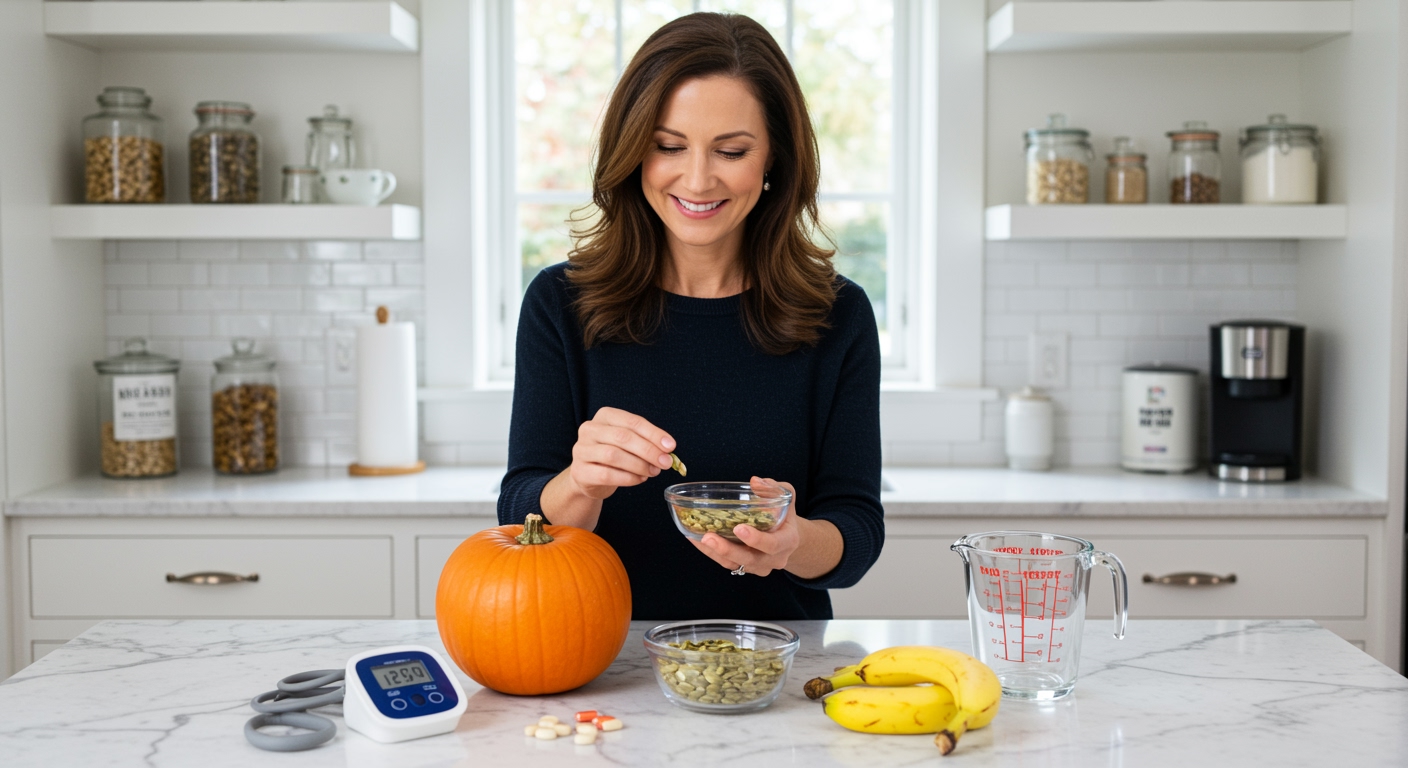✪ Key Takeaway: Pumpkin seeds may help lower blood pressure through magnesium and potassium content, but evidence remains limited.
Introduction
Your doctor just told you that your blood pressure is creeping up, and now you are searching for natural ways to bring it down.
You might be wondering if simple foods like pumpkin seeds can actually make a difference in your cardiovascular health.
Hi, I am Abdur, your nutrition coach, and today I am going to explain whether pumpkin seeds can truly help with blood pressure control and what the science actually says about this claim.
What Makes Pumpkin Seeds Special for Blood Pressure?
Pumpkin seeds contain several nutrients that researchers believe may influence blood pressure levels.
The most important of these is magnesium, with just one ounce of pumpkin seeds providing about 37% of your daily magnesium needs.
Magnesium works by helping your blood vessels relax and dilate, which can reduce the pressure against artery walls.
Pumpkin seeds also contain potassium, another mineral that helps balance sodium levels in your body.
When potassium levels are adequate, your kidneys can better regulate fluid balance and reduce the strain on your cardiovascular system.
Additionally, these seeds provide healthy fats and plant compounds called phytosterols that may support overall heart health.
✪ Fact: One ounce of pumpkin seeds contains about 168 mg of magnesium, which is more than many other nuts and seeds.
What Does the Research Actually Show?
The scientific evidence for pumpkin seeds and blood pressure is limited but shows some promising results.
Most studies focus on magnesium supplementation rather than pumpkin seeds specifically, making it difficult to draw direct conclusions.
Research on magnesium shows that people with higher intakes tend to have lower blood pressure readings.
A systematic review found that magnesium supplementation can reduce systolic blood pressure by 3-4 mmHg and diastolic pressure by 2-3 mmHg.
However, these effects are generally seen in people who were deficient in magnesium to begin with.
Some animal studies suggest that pumpkin seed oil may have blood pressure lowering effects, but human trials are still needed to confirm these findings.
The reality is that while pumpkin seeds contain beneficial nutrients, we cannot yet say definitively that eating them will significantly lower your blood pressure.
✪ Note: Most blood pressure benefits from magnesium are seen in people who were previously deficient in this mineral.
How Should You Include Pumpkin Seeds in Your Diet?
If you want to try pumpkin seeds for potential blood pressure benefits, moderation is key.
A reasonable serving size is about one ounce or roughly 1/4 cup of seeds per day.
You can eat them raw or lightly roasted, but avoid heavily salted versions since excess sodium can raise blood pressure.
Try adding them to salads, yogurt, or oatmeal for a crunchy texture and nutritional boost.
Remember that pumpkin seeds are calorie-dense, with about 150 calories per ounce, so they should replace other snacks rather than be added on top of your current intake.
The most important thing is to view pumpkin seeds as part of an overall heart-healthy eating pattern rather than a magic bullet for blood pressure control.
✪ Pro Tip: Roast pumpkin seeds with herbs and spices instead of salt to maximize their blood pressure benefits.
What Other Factors Matter More for Blood Pressure?
While pumpkin seeds may offer some benefits, other lifestyle factors have much stronger evidence for blood pressure control.
Reducing sodium intake to less than 2,300 mg per day can lower blood pressure by 2-8 mmHg in most people.
Regular physical activity, even just 30 minutes of brisk walking most days, can reduce blood pressure by 4-9 mmHg.
Maintaining a healthy weight is crucial, as losing even 5-10 pounds can make a meaningful difference in your readings.
The DASH eating pattern, which emphasizes fruits, vegetables, whole grains, and lean proteins while limiting processed foods, has been proven to lower blood pressure significantly.
Limiting alcohol intake and managing stress through techniques like meditation or deep breathing also play important roles.
Think of pumpkin seeds as a small piece of the puzzle rather than the complete solution to high blood pressure.
✪ Fact: The DASH diet can lower systolic blood pressure by 8-14 mmHg, which is much more significant than any single food.
The Bottom Line
Pumpkin seeds contain nutrients like magnesium and potassium that may support healthy blood pressure levels, but the evidence is not strong enough to consider them a primary treatment for high blood pressure.
Small changes in your kitchen can lead to big changes in your health, but consistency with proven strategies always wins over searching for magic foods.
I would love to hear your thoughts on this topic, so please share any questions or experiences you have had with natural approaches to blood pressure management in the comments section below.
References
At NutritionCrown, we use quality and credible sources to ensure our content is accurate and trustworthy. Below are the sources referenced in creating this article:
- PubMed: Magnesium intake and risk of hypertension
- PMC: Pumpkin Seeds Health Benefits
- American Heart Association: Pumpkin seeds pack a healthy punch
- Harvard Health: Seed of the month: Pumpkin seeds





